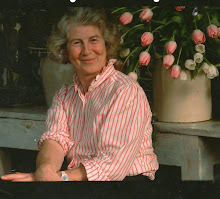 | ||
| A small section of my stores of laundered French linen and hemp sheets, all measured, laundered and stacked. |
My next laundress was really just a 'presser' - she was my weekly cleaner when I was first living and working in London and she had worked in an Irish shirt factory, ironing the newly stitched gentlemen's shirts as they came off the sewing machines - I had no idea how to iron my new husband's city shirts so was grateful for some very expert help - she always said that it took her exactly 20 minutes to iron a shirt, pressing every seam, and then pinning it all down in a box ready for sale.
I have written elsewhere about my grandmother's laundry and also about my Breton friend's laundress mother; these women worked immensely hard with a lot of very heavy carrying of buckets and wet washing, the endless scrubbing and rinsing and long hours of ironing with their heavy irons, gophering irons and other metal equipment and I have to remember that clothes on a farm were very dirty with all the rain and dirt making everything muddy as people worked on the land. There was no special protective work-wear then, plastic was unknown and there were only old sacks and rubber- lined mackintoshes to keep you dry and warm with a length of binder twine to hold all in place - not the Burberry touch! An old felt hat or a sou'wester kept some of the rain off your head and shoulders. and after work all had to be steamed dry in front of the kitchen range - airing cupboards were a luxury., but it was very usual (in Wales) to have a heavy brass rail, highly polished, just below the mantlepiece, to carry everything that needed heat and airing. You might think these were curtain poles, but they were often bevelled so the clothes did not slip off on the stove!


No comments:
Post a Comment